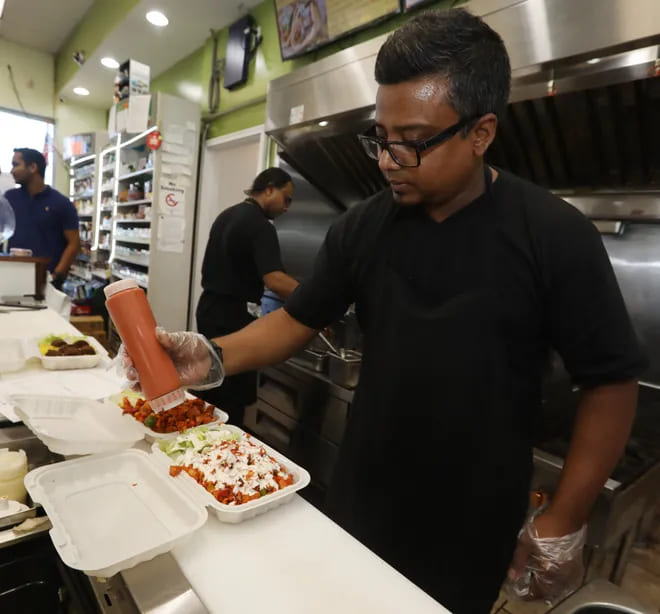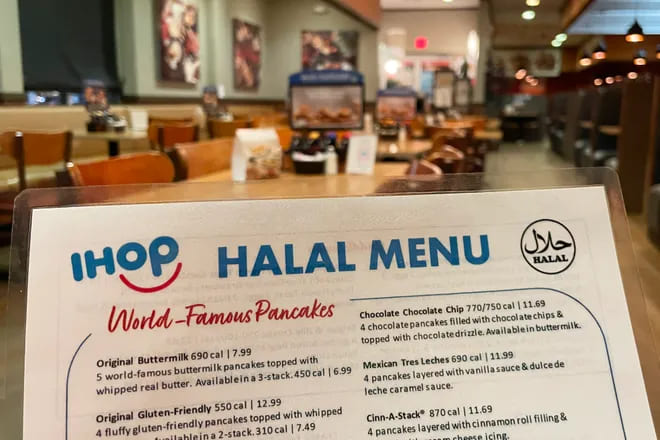Federal prosecutors announced an indictment of U.S. Sen. Bob Menendez and his wife Friday for allegedly accepting luxury gifts from a trio of New Jersey businessmen that includes Wael Hana, the head of IS EG Halal Certified. The Edgewater-based company obtained exclusive rights to certify halal products to be exported from the U.S. and elsewhere to Egypt.
The global halal food market, according to several market analyses, is estimated at $2 trillion and growing.
Which may have some people wondering: What is halal?
Here is an explainer.
What is halal?

Halal means “permitted” or “lawful.” It is a dietary law that comes from Islamic teachings in the Quran. Its opposite is haram, which means “not permitted.”
Need a break? Play the USA TODAY Daily Crossword Puzzle.
Put simply, halal foods are those that are not haram – pork and alcohol are the ones that most people are familiar with. But there are others, such as predatory animals that hunt with fangs and claws, according to Islamic Services of America (ISA), which educates and certifies within the halal industry.
According the American Halal Foundation, an easy way to remember what is is haram (not permitted) is:
“Everything is halal except ABCD IS haram”.
- A: Alcohol and anything else intoxicating, like drugs
- B: Blood – flowing or congealed
- C: Carnivorous animals (those predators)
- D: Dead meat – meat that is not slaughtered according to Islamic slaughtering rites
- I: Idols or immolation — Food offered as a sacrifice unto idols
- S: Swine and all swine derivatives
What does halal mean?
Halal is not just the list of which foods are permitted, it also governs the way meat is slaughtered. “For food to be halal, a Muslim must conduct the slaughter and say a word of prayer, ‘Bismillah,’ meaning ‘in the name of God.’” writes NorthJersey.com reporter Hannan Adely in her profile of ENA Meat Packing, a halal slaughterhouse in Paterson. “The animal must be healthy and alive at the time, and it must be done by hand swiftly with a sharp knife cut to the neck.”
Halal means “permitted” or “lawful.” It is a dietary law that comes from Islamic teachings in the Quran. Its opposite is haram, which means “not permitted.”
“The New Jersey Halal Food Consumer Protection Act requires businesses to live up to the promises and representations they make when selling or serving food represented as following Islamic tradition,” Adely writers. “Businesses are also required to prominently display information about foods marketed as halal, such as whether it contains pork products or alcohol, both of which are forbidden.”
Legal woes:Senator Menendez was indicted once before. Here’s the history
What is halal food?

According to ISA the following are considered halal, as long as they were not in contact or came from any haram sources:
- Bread products
- Cereals – breakfast, natural, and organic
- Cheese, cheese products and coatings
- Coffee mixes
- Dairy Products – whipped toppings and drink mixes
- Desserts – cakes and pastries
- Eggs – powdered, frozen, and processed
- Fish and Seafood
- French Fries and Processed Potatoes
- Fruits – fresh and/or dried
- Grains
- Honey
- Ice Cream and Ice Cream Toppings
- Jams and Jellies
- Legumes and Nuts
- Milk (from species considered Halal)
- Pastry Items – frostings and coatings
- Pastas
- Peanut Butter
- Pizzas
- Plants (which are non-intoxicating)
- Sauces and Dressings
- Seasonings
- Soup and Soup Base
- Syrups – table and flavored
- Tea Blends
- Vegetables – fresh and frozen
What is halal street food?
Halal street food is among the most popular in New York City — you can find the ubiquitous carts saying “halal food” all over. Owners of these carts usually serve a portion of halal meat — often chicken – alongside rice, lettuce and tomatoes as a sandwich or pita wrap or in a foil takeout container. The dish would not be complete without a swirl of spicy red or garlicky white sauce.
Who are the Halal Guys?
The Halal Guys are probably the best known purveyor of halal street food, and have expanded their cart to include national and international brick-and-mortar locations (Indonesia! London!). Their New Jersey locations include East Brunswick, Fort Lee, Lawrence Township, New Brunswick, Newark, Teterboro and Union.
